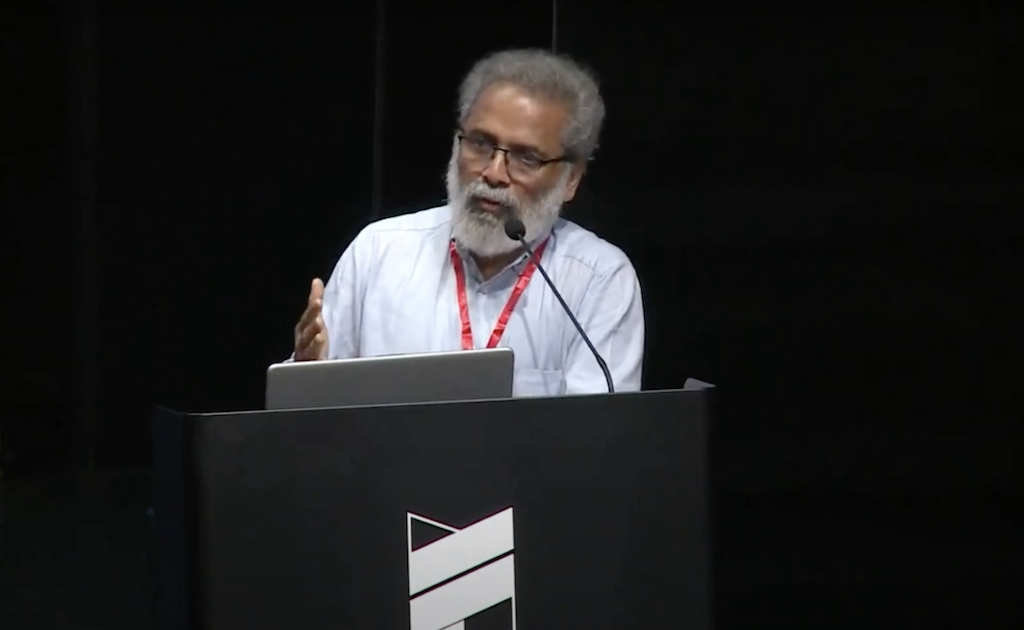Prof. (Dr.) Jiju Alex, an eminent scholar in agriculture and rural development, delivered a profound keynote at the 8th India Land and Development Conference (ILDC). Drawing from his extensive experience and Kerala’s pioneering initiatives, Prof. Alex explored how decentralized governance can be a cornerstone in building climate resilience and empowering local communities to address the challenges of climate change.
He began by framing the global debate on climate change, noting that while mitigation efforts to reduce carbon emissions dominate discussions, they are often misaligned with the realities of rural communities in India. “India’s contribution to global carbon emissions is relatively low,” he stated, “and the onus of mitigation should lie more with the major emitters. For rural India, the focus must shift to adaptation—ensuring that people are safeguarded from climate impacts while securing their livelihoods and dignity.”
Central to his address was Kerala’s unique approach to decentralized governance, enabled by the 73rd and 74th Constitutional Amendments. These provisions empower local governments to intervene in sectors deeply affected by climate change, including agriculture, water management, and disaster preparedness. Kerala, he explained, has gone beyond most Indian states by devolving significant resources—30% of the state’s plan funds—to local governments. This financial empowerment, coupled with a structured system of Gram Sabha consultations, allows local bodies to convert community aspirations into actionable projects. “Without this financial and institutional autonomy,” he asserted, “decentralization would remain a mere buzzword.”
Prof. Alex detailed how Kerala has operationalized this framework to address climate vulnerability and disaster preparedness. The devastating floods of 2018 and 2019 served as a wake-up call, prompting the state to institutionalize mechanisms such as Rapid Response Teams and Youth Brigades. These grassroots efforts have been formalized into disaster management plans and local climate action plans, meticulously tailored to the specific risks faced by each Panchayat. "Adaptation is paramount," he emphasized. "It’s about protecting lives, assets, and livelihoods while creating awareness and preparedness among the most vulnerable."
A standout innovation in Kerala’s strategy is the Disaster Risk Management and Climate Action Tool (DCAT), developed to assess and incentivize climate responsiveness at the local level. This tool combines three key indices: climate vulnerability, disaster proneness, and governance responsiveness. Using scientific data and expert evaluations, the tool provides a composite score for each local body, influencing both resource allocation and the prioritization of climate-sensitive projects. Prof. Alex highlighted how this data-driven approach has been integrated into state and World Bank-funded initiatives, linking performance with financial incentives. “This isn’t just about measuring preparedness,” he noted, “but about ensuring accountability and promoting proactive governance.”
The effectiveness of these initiatives, he argued, lies in their holistic approach. Local governments are required to allocate a significant portion of their funds to productive sectors such as agriculture, while limiting spending on non-essential infrastructure. This ensures that resources are directed toward sustainable development and resilience-building efforts. Prof. Alex underscored the importance of collaboration across agencies and sectors, noting that siloed efforts will never achieve the scale required to combat climate challenges. “Robust decentralized governance is the linchpin,” he stated, “bringing together communities, civic organizations, and scientific expertise to create lasting solutions.”
In concluding his keynote, Prof. Alex called for a nuanced understanding of the roles rural and urban communities play in the climate equation. While acknowledging the importance of mitigation, he reiterated that adaptation must be prioritized for India’s small and marginal farmers, who contribute minimally to global emissions but bear the brunt of its consequences. “The great contributors to carbon emissions must shoulder the burden of mitigation,” he argued. “For rural India, the path forward is through empowered, adaptive, and decentralized governance.”
Prof. Alex’s keynote was both a masterclass in policy innovation and a rallying cry for systemic change. His insights, rooted in Kerala’s successes, offer a roadmap for other states and nations grappling with the twin challenges of climate resilience and sustainable development. His vision, as he aptly put it, is “a future where local action drives global impact, and governance truly serves the people it represents.”

